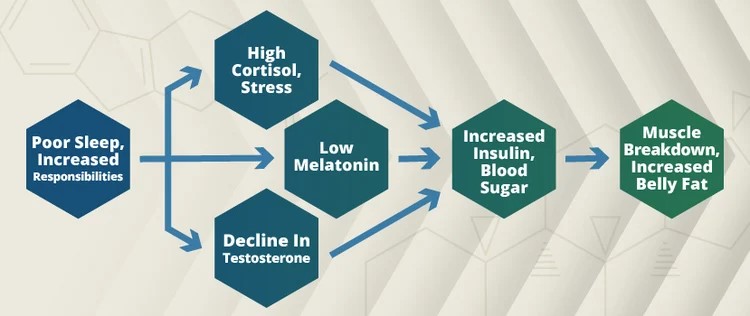If you have heard the term “dad bod”, it probably triggered a distinct mental image. Body composition changes that smooth out muscular definition (increased body fat and decreased muscle mass) occur with ageing but may feel sudden or rapid after becoming a parent. This is familiar to men and women alike, but the details of why this happens might not be entirely clear to the average dad.
Lifestyles Change Rapidly with Fatherhood
While you were busy raising kids and supporting your growing family, your lifestyle changed – and probably rapidly. First, adequate sleep seems like a distant memory. Time to exercise seems impossible. Food options on the table are limited.

The stress of juggling work and family is through the roof. These changes can occur gradually for anyone, with or without kids. However, with fatherhood, these changes are all but guaranteed to occur suddenly.
Identifying the most relevant issues that impact body composition is the first step to combatting the dad-bod changes. The research is clear on the relevant targets: sleep, physical activity, diet, testosterone, and cortisol (stress)1. These targets are all connected and, luckily, so are their solutions.
Before diving into the science behind a father’s changing lifestyle and body, it’s important to recognise that the “dad bod” is hopefully an affectionate term. Physical changes are due to new priorities that occur with having children or being in a caregiving role. These roles (being a father and being a supportive partner) can be the most fulfilling and purposeful times in anyone’s life. A decline in self-care is natural with new challenges and shows involvement and dedication, which is something worth celebrating! Reviewing these health impacts is in no way an endorsement of pursuing unrealistic body standards while sacrificing connection with your family. The goal is to arm men with the knowledge to incorporate lifestyle changes that support their energy and health.
The Effect of Poor Sleep on Male Physical Health
Every parent jokes about the loss of sleep with babies, but it is no joke. New parents lose 1-3 hours of sleep per night in the first year.2 While most nighttime care is done by women, even a small amount of lost sleep has a profound effect on both men and women. There are numerous studies done on the health and weight impact of sleep loss on mothers, but not as much on fathers. Sleep loss is an important factor in the decline in physical health in men, too.
Loss of sleep causes three hormonal changes
- Lower testosterone
- Lower melatonin
- Higher cortisol


Sleep and Melatonin
Loss of sleep causes a third hormonal impact: lower melatonin. This hormone is a powerful antioxidant and promotes deep and restful sleep. Not only does melatonin help you get better rest, but it also helps your body burn fat and stay lean through numerous physiological pathways.2 It may improve insulin sensitivity and reduce inflammation and oxidation.
Fatherhood is Sometimes Followed by Diet and Lifestyle Changes
In addition to the above hormonal impacts on weight, physical activity and diet also appear to decline with fatherhood. Sometimes referred to as “mom snacks”, dads are also inclined to eat the same foods they make for their kids. To feed picky children well, high-fat and high-sugar foods are often served to kids. These enticing crowd-pleasers are difficult for parents to resist. This can result in the whole family eating sub-optimal, weight gain-promoting, low-nutrition foods. This is unfortunate because while children often don’t immediately show the negative impacts of a poor diet, those impacts are still there.
As for physical activity, the types of activities that provide plenty of intense exercise for little ones typically do not challenge an adult male. And since time is limited, getting to the gym or out to other activities can be nearly impossible some days or weeks. Again, like dietary changes, children benefit from a physically active family in ways that are not always immediately obvious.
What Can Men Do to Get Rid of the Dad Bod?
Optimise sleep
Sleep is best supported by low lights, minimal distractions, and improving daytime stress management, which in turn can increase natural melatonin levels. Depending on your situation, you may have unavoidable sleep disruptions, but prioritising sleep can have numerous benefits on health and should be a top priority. This includes improving melatonin, normalising cortisol, and optimising testosterone levels. From improving mood and focus to helping with weight management and hormone balance, sleep is not only enjoyable for tired dads, but it’s a big win for the body.
If you’re considering melatonin supplements*, be aware that melatonin may not prevent weight gain because loss of sleep causes weight gain in several ways. There is no magical weight loss supplement, however, some find it helps optimise sleep during times of increased stress, and some studies do show it may improve weight management.7. After increased cortisol, sugar cravings that occur with fatigue, and reduced testosterone, sleep, and optimal melatonin are only a small piece of the puzzle, but they shouldn’t be neglected.
Manage stress
Meditation and cognitive behavioural therapy (CBT) are simplifying life and accessible ways to lower cortisol. Since cortisol and stress are big components of weight gain, many find relaxation to be the most enjoyable part of a weight loss strategy, but it is often neglected. Don’t let this gem of a strategy pass you by.
Focus on healthy whole foods
Whole foods provide nutrients, protein, and fibre which help with blood sugar and weight management. This is important for the whole family!
Increase exercise
Physical activity not only burns calories and builds muscle, but helps sleep, improves insulin sensitivity, and lowers cortisol. Children are not likely to enjoy running laps or lifting weights, therefore activities should be creatively designed. Turning family play days into a time for lifting, running, and jumping can increase overall physical activity. The main takeaway is that men become more sedentary with parenthood (or ageing), and it doesn’t need to be that way.
Test your hormones
Sometimes it might be best to measure hormone levels including sex hormones and adrenal hormones. Testing can also give insights into the circadian rhythm and melatonin. A comprehensive hormone test can help you figure out if you need a more clinical approach to your lifestyle changes.
Men’s health is an often-neglected topic when it comes to fatherhood, ageing, and/or hormones. However, lifestyle changes associated with ageing or fatherhood can lead to loss of muscle mass and abdominal weight gain. These changes are not inevitable but are the result of poor sleep, a decline in testosterone, increased stress, an inflammatory diet, and reduced physical activity. Fast fixes like crash diets and short-lived exercise programs may increase stress and negatively impact hormones even further, failing to address the root cause. In truth, the root causes should be addressed first by assessing and optimising sleep, stress, and testosterone and making steady lifestyle improvements.
* Note – Melatonin supplements are unavailable in New Zealand, if you’d like to have a conversation about prescribed melatonin, visit your GP
- Saxbe D, et al. The weight of fatherhood: identifying mechanisms to explain paternal perinatal weight gain. Health Psychol Rev. 2018;12(3):294-311.
- Guan Q, et al. Mechanisms of Melatonin in Obesity: A Review. International Journal of Molecular Sciences. 2021;23(1):218.
- Wittert G. The relationship between sleep disorders and testosterone in men. Asian J Androl. 2014;16(2):262-265.
- O’Byrne NA, et al. Sleep and the Testis. Curr Opin Endocr Metab Res. 2021;18:83-93.
- Zitzmann M, et al. Association of Specific Symptoms and Metabolic Risks with Serum Testosterone in Older Men. J Clin Endocrinol Met. 2006;91(11):4335-4343.
- Paredes S, Ribeiro L. Cortisol: the villain in metabolic syndrome? Rev Assoc Med Bras (1992). 2014;60(1):84-92.
- Genario R, et al. Melatonin supplementation in the management of obesity and obesity-associated disorders: A review of physiological mechanisms and clinical applications. Pharmacol Res. 2021;163:105254.
Share:
Related Posts

Why Would I Test Positive To Foods On A Dietary Antigen Test That I Don’t Eat?
Written by Precision Point Diagnostics | 2025 True food allergies are when the body develops antibodies against a particular food, or a related food. Patients

Mitochondria: The Overlooked Link in the Gut-Brain Axis
Written by Dr Sarah Daglis | 2025 The gut-brain axis is well-established, but there’s more to this dynamic relationship than meets the eye. A vital

Unlocking Respiratory Resilience Through Functional Medicine
Article written by Dr Michelle Clark Naturopathic Doctor Clinical Education Manager, FxMed Published 1 September 2024 People take supplements to improve or optimize their health.

AHCC: Unlocking the Immune Intelligence of Shiitake Mycelia
Article written by Jessica Sanders BSc. (Psy), Dip Nat, Dip Med Herb Technical Projects, FxMed Published 1 September 2024 People take supplements to improve or

Life After Weight Loss Meds
Kathi Head, ND February 20, 2025 You would have to have been spending glorious hours lying on the beach on a desert island not to

